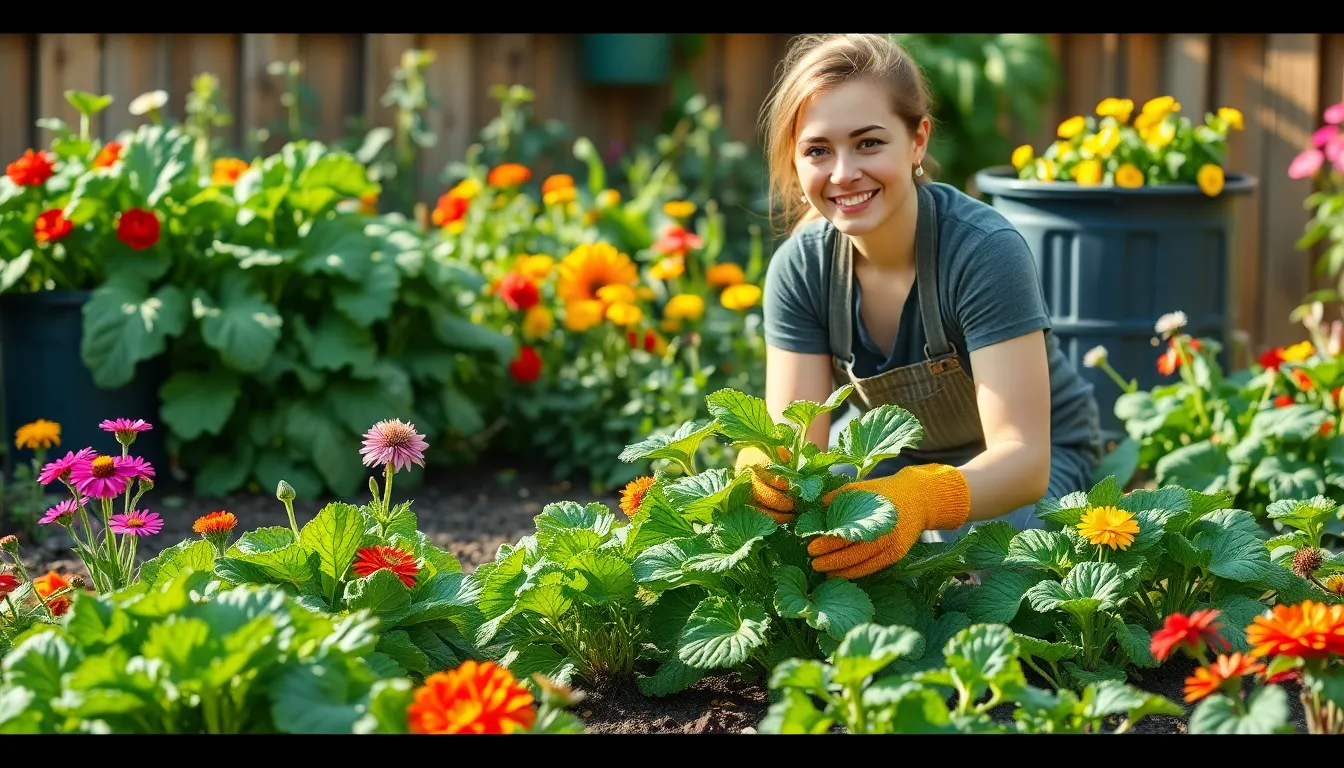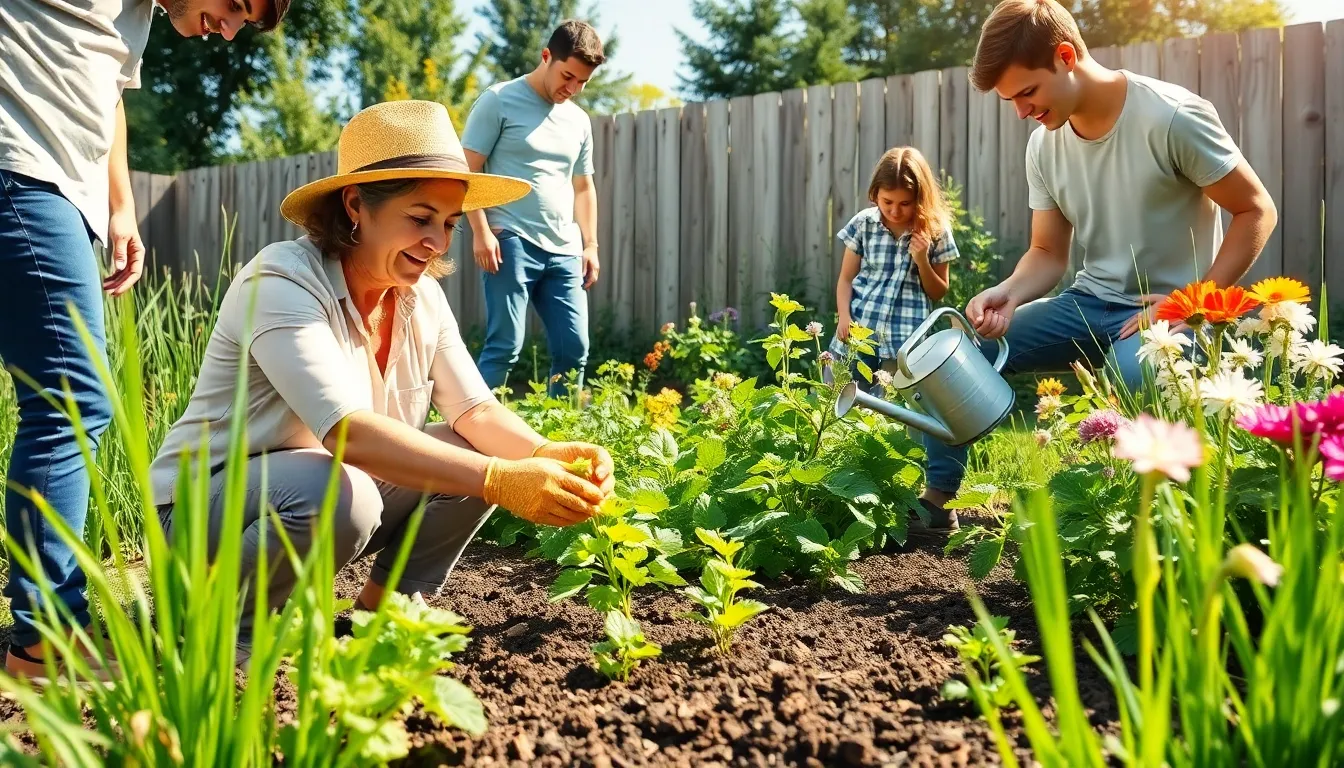Imagine stepping into your backyard oasis, where vibrant veggies and flowers thrive without a hint of chemicals. Organic gardening isn’t just a trend; it’s a delightful journey toward healthier living and a happier planet. Whether you’re a seasoned green thumb or just trying to keep that one succulent alive, this guide will transform your gardening game.
Table of Contents
ToggleOverview of Organic Gardening
Organic gardening emphasizes the use of natural methods to grow plants and produce food. It excludes synthetic fertilizers, pesticides, and genetically modified organisms, focusing instead on sustainable practices that enhance soil health. This approach promotes biodiversity, aiding beneficial insects and organisms that contribute to crop health.
Soil plays a crucial role in organic gardening. Healthy soil contains essential nutrients and microorganisms that support plant growth. Techniques like composting improve soil quality by adding organic matter and enhancing nutrient availability. Implementing crop rotation further prevents soil depletion and reduces pest problems.
Pest management in organic gardening relies on natural solutions. Implementing techniques such as companion planting helps deter pests and encourages beneficial insects to thrive. Organic gardeners can use organic pesticides made from plant extracts when necessary, ensuring they remain environmentally friendly.
Water conservation remains a priority in organic gardening. Utilizing rain barrels and drip irrigation systems ensures efficient water use. Mulching around plants conserves moisture while suppressing weeds.
Additionally, selecting native plant species supports local ecosystems and minimizes maintenance. Native plants are better suited to local climates and often require less water. By promoting organic gardening, individuals contribute to a healthier environment and produce sustainable food sources.
Exploring organic gardening offers a rewarding experience, whether for personal enjoyment or broader community impact. Mindful practices benefit personal health, foster environmental stewardship, and pave the way for future generations to enjoy gardening.
Benefits of Organic Gardening

Organic gardening offers numerous advantages for both the gardener and the planet. Sustainable practices enhance the quality of food produced while fostering environmental health.
Environmental Impact
Organic gardening significantly reduces chemical runoff into soil and water systems. Practices like composting enrich the soil without synthetic fertilizers, promoting nutrient retention. Biodiversity thrives in organic gardens, providing habitats for beneficial insects and wildlife. Native plant selection supports local ecosystems, enhancing resilience against pests and diseases. Water conservation methods reduce overall consumption, which addresses global shortages. Such practices collectively lead to healthier environments and mitigate climate change.
Health Advantages
Gardening organically yields fresh produce free from harmful chemicals. Consuming organic fruits and vegetables helps avoid pesticide residues linked to various health issues. Increased nutrients in soil promote robust plant growth, leading to more vitamins and minerals in harvested crops. Engaging in this gardening method encourages physical activity and provides psychological benefits, such as reduced stress and improved mood. Organic gardening fosters a deeper connection to food sources, enhancing overall awareness of dietary choices.
Essential Tools for Organic Gardening
Selecting the right tools enhances the organic gardening experience and promotes efficiency. Two main categories stand out: hand tools and power tools.
Hand Tools
Hand tools are essential for precision and control in organic gardening. Trowels assist with digging holes for planting, while hand pruners allow for accurate trimming of plants. Garden forks aerate soil, improving root health, and hoes help with weed management. Rakes play a critical role in leveling soil and removing debris. Each tool supports specific activities, ensuring that the gardener maintains a healthy environment for plants. Purchasing high-quality materials for these tools enhances durability, contributing to long-term gardening success.
Power Tools
Power tools save time and reduce physical labor in organic gardening. Electric tillers quickly break up hard soil, promoting better aeration and root development. String trimmers effectively manage overgrown areas, helping maintain garden boundaries. Leaf blowers simplify the cleanup process, making it easier to remove debris. Each power tool provides unique advantages, streamlining tasks and fostering a more productive gardening experience. Investing in reliable power tools boosts efficiency, allowing gardeners to focus on sustainable practices.
Soil Health and Preparation
Soil health is paramount in organic gardening. Healthy soil sustains plants, providing them with essential nutrients and microorganisms.
Composting Methods
Composting serves as a cornerstone for enriching soil. Home composting can be done through methods like hot composting, which speeds up decomposition through heat, or cold composting, requiring less work but taking longer to break down materials. Additionally, worm composting enhances nutrient content by utilizing red worms to process organic waste. Each method offers valuable nutrients, promoting vibrant plant growth.
Soil Testing
Soil testing identifies nutrient levels and pH balance. Conducting tests allows gardeners to understand soil characteristics, guiding them towards precise amendments. Soil tests reveal deficiencies, ensuring that essential nutrients are replenished effectively. Regular testing anticipates changes in soil composition, enabling tailored treatment for optimal plant health. Accurate soil information leads to a targeted approach in organic gardening practices, promoting sustainability and success.
Choosing the Right Plants
Selecting the right plants plays a vital role in successful organic gardening. Understanding seasonal growth patterns and plant pairings enhances yield and garden health.
Seasonal Planting
Timing is key when choosing plants for an organic garden. Each season hosts specific crops that thrive best in those conditions. Spring favors cool-season vegetables like lettuce and peas, while summer suits warm-season varieties such as tomatoes and peppers. Late summer and fall allow for planting hardy crops, including kale and carrots, that can withstand cooler temperatures. Gardeners should consider frost dates and local climate conditions to optimize planting schedules. Utilizing a seasonal calendar ensures an efficient and productive crop rotation, enhancing overall garden performance.
Companion Planting
Companion planting fosters a harmonious garden ecosystem. Certain plants naturally support one another, improving growth and pest resistance. For example, tomatoes and basil enhance each other’s flavors and deter pests. Similarly, marigolds repel nematodes when planted alongside vegetables, protecting crops without chemicals. Pairing crops that share similar water and sunlight requirements contributes to efficient resource use. Understanding and applying companion planting principles not only maximizes space but also promotes biodiversity in the garden. Together, these strategies create a thriving environment that nurtures plant health and resilience.
Pest Management in Organic Gardening
Pest management employs natural solutions, avoiding synthetic chemicals. Emphasis falls on various methods that align with organic principles.
Natural Pest Control
Natural pest control addresses infestations using beneficial insects and organic pesticides. Ladybugs and lacewings serve as valuable allies, targeting harmful pests like aphids. Neem oil and insecticidal soap act as effective organic pesticides derived from plants. These products disrupt insect life cycles while posing minimal risk to non-target species. Crafting homemade repellents, such as garlic or pepper sprays, provides additional protection against unwanted pests. Maintaining a diverse ecosystem within the garden fosters a balance where beneficial species thrive while deterring harmful ones.
Preventative Measures
Preventative measures enhance pest management by creating unfavorable environments for pests. Crop rotation disrupts pest life cycles and reduces infestations. Implementing companion planting introduces synergy among plants, naturally repelling pests. Cover crops improve soil health and hinder pest establishments, providing nutrients while controlling weeds. Regular inspections of plants help identify issues early, allowing for prompt intervention. Maintaining healthy soil through composting and mulching strengthens plant resilience against pests and diseases. Prioritizing these strategies fosters a thriving, pest-resistant organic garden.
Organic gardening offers a fulfilling way to cultivate a thriving garden while supporting the environment. By embracing natural methods and sustainable practices, gardeners can enjoy fresh produce and contribute to healthier ecosystems. The journey involves understanding soil health, implementing effective pest management, and conserving water, all of which enhance the gardening experience.
With the right tools and plant selections, anyone can embark on this rewarding path. The benefits extend beyond just growing food; they foster a deeper connection with nature and promote overall well-being. Organic gardening is not just a hobby; it’s a lifestyle choice that nurtures both personal health and the planet’s future.






